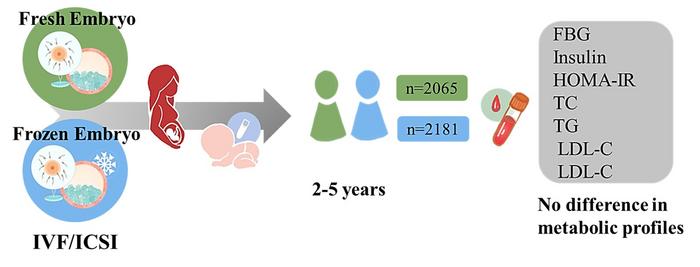Children born via frozen embryo transfer have similar metabolic profiles to those born via fresh embryo transfer, according to a study published June 6th in the open-access journal PLOS Medicine by Linlin Cui and Zi-Jiang Chen from Shandong University, China, and colleagues.

Credit: Zhou Jiayi (CC-BY 4.0, https://creativecommons.org/licenses/by/4.0/)
Children born via frozen embryo transfer have similar metabolic profiles to those born via fresh embryo transfer, according to a study published June 6th in the open-access journal PLOS Medicine by Linlin Cui and Zi-Jiang Chen from Shandong University, China, and colleagues.
Prior studies have shown inconsistent results on the long-term metabolic health impacts of assisted reproductive technology. Some have shown that children born via frozen embryo transfer have a higher risk of metabolic disorders, such as obesity, and unfavorable lipid profiles. Other studies have failed to find any significant metabolic differences between those born via frozen or fresh embryo transfer.
In this study, researchers compared the glucose and lipid profiles of more than 4,000 children between 2 and 5 years of age—approximately half had been born via fresh embryo transfer and half had been born via frozen embryo transfer.
Researchers followed the children for an average of 3.6 years and assessed metabolic factors often associated with heart disease and diabetes, such as fasting blood glucose, insulin, cholesterol, and triglycerides.
They found no difference in any of the metabolic factors among children born via fresh embryo transfer and those born via frozen embryo transfer.
Given the relatively large number of participants in this study, the researchers were able to conduct subgroup analyses. After dividing the children into groups based on gender, age, embryo transfer state, and method of conception, there were still no differences in metabolic factors among the frozen and fresh embryo transfer groups.
The study provides more information to women and couples weighing the pros and cons of different techniques offered for assisted reproduction, but the researchers noted the need for additional data on the effect of assisted reproductive technology on long-term metabolic health.
The authors add, “Frozen embryo transfer shows no significant adverse effects on metabolic profiles in early childhood, providing crucial evidence for counseling couples undergoing assisted reproductive technology treatment on its safety.”
#####
In your coverage, please use this URL to provide access to the freely available paper in PLOS Medicine: http://journals.plos.org/plosmedicine/article?id=10.1371/journal.pmed.1004388
Citation: Zhou W, Feng W, Chang J, Hu J, Li F, Hu K, et al. (2024) Metabolic profiles of children aged 2–5 years born after frozen and fresh embryo transfer: A Chinese cohort study. PLoS Med 21(5): e1004388. https://doi.org/10.1371/journal.pmed.1004388
Author Countries: China
Funding: This study was supported by the National Key Research and Development Program of China (2021YFC2700700 to LC), CAMS Innovation Fund for Medical Sciences (2021-I2M-5-001 to Z-JC), Basic Science Center Program of NSFC (31988101 to Z-JC, 82171692 to LC), Shandong Provincial Natural Science Foundation (ZR2022JQ33 to LC), General Program of Shandong Provincial Natural Science Foundation of China (ZR2022MH087 to WZ), National Special Support Program for High-level Talents (no Grant numbers to LC), and Taishan Scholars Program for Young Experts of Shandong Province (tsqn201909195 to LC).The study funders had no role in the study design, data collection or analysis, decision to publish, or preparation of the study.
Journal
PLoS Medicine
DOI
10.1371/journal.pmed.1004388
Method of Research
Observational study
Subject of Research
People
COI Statement
Competing interests: The authors have declared that no competing interests exist.




